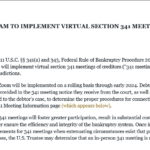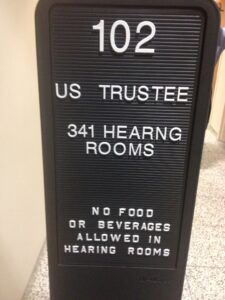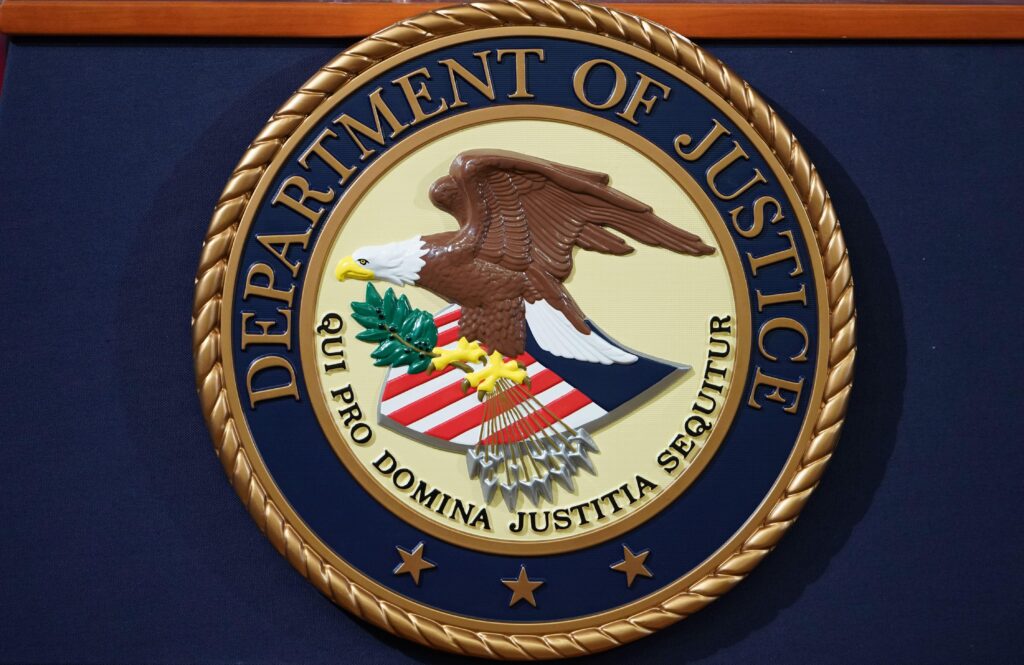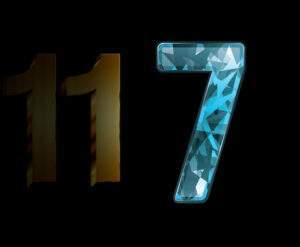Table of Contents
Remote 341(a) Meeting of Creditors by Zoom: What to Expect in 2023
Zoom 341a Meetings, explained by Los Angeles Bankruptcy lawyer
Remote 341(a) Meetings of Creditors by Zoom in bankruptcy are becoming the standard, instead of in-person. Here’s what to expect. They can be terrifying, nerve-wracking, and unpredictable. But there are ways you can prepare for a Zoom 341a Meeting to help it go more smoothly.
As someone who has attended thousands of 341s in person (after coaching my clients with my list of 12 prefiling do’s and don’ts), I answer your 341(a) questions and share with you what to expect at your 341(a) meeting in a post-pandemic world where Zoom 341(a) meetings are more common, and soon becoming the standard.

Summer 2024 update: The US Trustee has announced that all 341a meetings will soon be by Zoom, on a rolling basis through early 2024. This means that all debtors are expected to be visible on camera during their questioning. Test your ability to connect with Zoom with a friend or relative before your meeting; gone are the days of literally phoning it in. If you have a bankruptcy attorney, he or she will generally be happy to go over this with you. But you really don’t want to wait to test things until the day of the Section 341 meeting.
What is the 341(a) Meeting of Creditors?
The 341a Meeting of Creditors is a requirement in every bankruptcy where the debtor (you) gets put under oath and is required to answer questions truthfully about your assets and financial condition. It’s a gathering, like a conference call. While it’s called a 341(a) meeting, it’s not really a meeting, but more like a polite, professional, semi-aggressive grilling.
Who attends the 341a Meeting?
You, the debtor, must attend the 341a meeting. Also, there will be a bankruptcy trustee. And of course, all of your creditors will get notified about it. Let’s break it down.
First, of course you must show up at your 341 meeting, which post-pandemic will likely be a remote 341(a) meeting. Again, this is done by telephone, Zoom, or some other technology. This choice is at the discretion of your Chapter 7 trustee. It varies trustee to trustee, so that’s why this is general; there is no one uniform set way how a trustee runs his or her 341(a) meeting.
Second, the Chapter 7 trustee will attend. It’s their show, and they will aggressively pursue assets you have or used to have, within the boundaries of the law. They run the meeting, which is more or less like a court deposition, with 20-40 other people able to hear or watch you on the phone or Zoom (or Webex or Skype, but usually Zoom).

Third, creditors can attend. These are the people to whom you owe money, and they have every right to show up, dial in or call and grill you under oath.
Fourth, the United States Trustee may call in or attend your remote 341(a) meeting of creditors. The Office of the US Trustee (UST or OUST) is the arm of the Department of Justice responsible for administering bankruptcies fairly and justly. They work with the FBI in the DOJ to investigate bankruptcy crimes, like hiding assets. The goal of the UST is to ensure that justice is being done, and everyone seeking relief is the “honest but unfortunate debtor.” If the US Trustee shows up at your Zoom 341(a), there’s a suspicion of mischief, such as moving your stuff around, making false statements in your papers, lying about income, or some other thing where maybe you’re not entitled to a Chapter 7 bankruptcy discharge… or worse, like prison time.
Fifth, other debtors will be waiting their turn for their remote 341(a) meetings. There will be about 30 people or so, all listening in, waiting their turn, trying to learn the standard 341(a) questions.
Finally, your bankruptcy attorney (and a bunch of other bankruptcy lawyers) will be there. This is probably (hopefully!) the only time in your life where you’ll be testifying under oath, with penalty of perjury. You can wing it and hope for the best, but you really want a lawyer who’s personally handled thousands of 341(a) meetings to be with you.
Do my creditors actually show up at the 341(a) Meeting?
Generally, your creditors won’t attend. This is because they know the bankruptcy trustee is representing their interests, and will ask you all the questions they would have asked. But they might. They know about the meeting because you have an obligation to list in your bankruptcy petitions or schedules (the bankruptcy papers) every debt you owe, or even might owe. You listed their addresses. When you filed the bankruptcy papers, the court clerk sent them all a notice. It’s each one’s choice if they want to show up and ask you questions under penalty of perjury.
So, who is the bankruptcy trustee who will be asking me questions?
In Chapter 7 bankruptcy, the trustee is an attorney, accountant, or other professional who is appointed by the Department of Justice to seek assets of yours they can take for the benefit of your creditors. They are bound by duty to follow the US Trustee handbooks and reference materials.
Wait, they can take my stuff?
You bet. That’s the trustee’s primary goal, and what Chapter 7 bankruptcy is all about. You read about “Liquidation bankruptcy” on boring websites, but that’s the whole idea. They can liquidate (fancy word for “sell”) your assets (fancy word for “stuff”), if those assets are beyond the exemptions in your state.
Then I’ll just give away or sell that thing to a good friend or relative.
You don’t want to do that. Transfers before a bankruptcy are often fraudulent transfers, and can end up causing a lawsuit for your friend or family, and you’ll lose the thing anyway.
Where is the 341(a) Meeting of Creditors?
Ever since the 2020 pandemic, you can usually attend your 341(a) meeting remotely by phone or Zoom.
So this could be just a phone call. This is super easy.
Don’t let the format deceive you. The remote 341(a) meeting should be treated like a formal court hearing, as if you’re under oath standing in front of a federal judge. Because if things go wrong, you very well might be.
How do they even know it’s me?
The bankruptcy trustee verifies your identity with two forms of identification. When 341(a) meetings were done in person, you would physically hand the trustee or their administrator your unexpired original photo ID and a Social Security card. Now that the hearings are done remotely, you or your bankruptcy attorney will have to provide a copy of these documents (picture ID and proof of SSN) to the trustee. When you go on Zoom, they’ll ask you or your bankruptcy attorney if these are really your documents.
What do I have to do before a 341(a) meeting?
Because the meetings are now done remotely, it’s not so simple anymore as just handing over documents. You now have to get the papers and identification to the bankruptcy trustee beforehand. They’ll typically email your bankruptcy attorney how and where to upload the documents. If you gambled and filed bankruptcy without a lawyer, you’ll likely get something in the U.S. mail. Most Chapter 7 trustees use an online portal where documents are uploaded, though it’s possible some will accept them by email.
What documents do I have to provide to the bankruptcy trustee?
You already know you need to get proof of your identity to the bankruptcy trustee, one with a picture of your face, and another that verifies your Social Security number. Most bankruptcy trustees have a bankruptcy debtor’s questionnaire. Back when the 341(a) meetings were done in person, you’d fill it out while sitting and waiting your turn. Now that we have remote 341a meeting of creditors, you’ll need to complete this in advance, and return it to the trustee. You also must provide your tax return for the last year filed. Many Chapter 7 trustees want to see your bank statements for all accounts for the months prior to filing. It’s possible the bankruptcy trustee will ask you for more documents like mortgage or car loan statements, property deeds, closing statements from refinances or sales you did years ago, etc. so be prepared for some homework.
What happens at the 341(a) Meeting?
On the day of the 341(a) hearing, you’ll connect to the Zoom 341(a) meeting of creditors, or phone in. You’ll mute your line so it’s not chaos and noisy. They call your name, they swear you in, the trustee then questions you like at a deposition, then invites your creditors who attended if they wish to examine you under oath. They often conclude your meeting, but sometimes continue it to a different date so that the trustee can get more documents or information as he or she does due diligence. Oh, and just in case you forgot already: mute your line until your name is called.
What does a US Trustee 341(a) Meeting Room look like?
The US Trustee 341(a) Meeting room is a room with chairs facing forward with this Department of Justice seal prominently in the room. This should impress upon you the seriousness and solemnity of the event. Because you’re attending the 341(a) meeting in your pajamas in the comfort of your own home you may be led to believe this is a very casual process. It is not. Look at the seal below. Now, imagine getting a formal letter from the Department of Justice with this picture at the top of it mailed to your house, with a deadline, because of something you said at the 341(a) meeting or put in (or left out) of your bankruptcy papers. This is a serious formal proceeding. Tell the truth about everything.

What are the questions they ask at a 341(a) Meeting of Creditors?
There are questions every person must answer at a remote or Zoom 341(a) Meeting, and often the questions are custom-tailored to you and your situation. When it’s your turn, they call your name. You then and only then unmute yourself. First, they’ll tell you to raise your right hand and then ask, “Do you solemnly swear or affirm to tell the truth, the whole truth, and nothing but the truth?”
The bankruptcy trustee will then ask some of the following questions. This is not intended to be a complete list, but just to give you an idea of what you may be asked.
“State your name. Is the address on the petition your current address?”
“Did you sign the petition, schedules, statements, and related documents and is the
signature your own? Did you read the petition, schedules, statements, and related
documents before you signed them?”
“Are you personally familiar with the information contained in the petition, schedules, statements and related documents? To the best of your knowledge, is the information contained in the petition, schedules, statements, and related documents true and correct? Are there any errors or omissions to bring to my attention at this time?”
“Are all of your assets identified on the schedules? Have you listed all of your creditors on the schedules?”
“Have you previously filed bankruptcy?”
“What is the address of your current employer?”
“Is the copy of the tax return you provided a true copy of the most recent tax return you filed?”
“Do you have a domestic support obligation, and to whom?”
“Have you read the Bankruptcy Information Sheet provided by the United States Trustee?”
“Do you own or have any interest whatsoever in any real estate?”
“Have you made any transfers of any property or given any property away within the last four years?”
“Have you been engaged in any business during the last six years?”
Note that business can be as small as that side gig you have selling things on Ebay or Etsy, or driving for Lyft. If you do have a business or business income, that opens up other questions. You’ll also get other questions if you own a car, own real estate, bitcoin, life insurance proceeds, claims against anyone, and so on.
Always tell the truth, and again, even if you think you have nothing to hide, you really want to have an attorney representing you when you’re put under oath, and in any legal proceeding such as bankruptcy.
How do I prepare for a Meeting of Creditors?
You already know the bankruptcy petition, schedules, and statement of affairs, as it’s all about you, your life, and your financial condition. And of course, it’s all truthful and complete, listing all your assets, debts, and income. Because of that, there’s nothing to memorize.
You’ll want to get a good night’s sleep, and get to bed early so you’re well-rested. Before you go to bed, have the Zoom meeting number and password (or phone number and pin pass code) the chapter 7 trustee provided you ready so you’re not scrambling in the morning.
Also, read the bankruptcy information sheet. It’s often called the green brochure, green sheet, or green pamphlet, since back in the days of covered wagons when we were in person, that’s what it looks like.
Do I have to tell the truth at the 341(a) meeting?
I know what you’re thinking.
What?
You’re wondering about maybe telling a couple of little white lies and not disclosing assets or income or that one debt to see if you can beat the system.
Maybe.
That’s not going to work. You’re under oath in a federal legal proceeding. Tell the truth, and the full truth.
Yeah but how will they know if I don’t?
The bankruptcy trustee has government resources, databases, and records, and the UST and Dept of Justice have a budget and resources far greater than yours.
Also, FBI agents investigate bankruptcy crimes.
I was just kidding anyway.
Just tell the truth, about everything. Do you want to go to jail for bankruptcy crimes like Boris Becker?
No.
Then there’s your answer.
What about Chapter 13 Bankruptcy 341(a) Meeting of Creditors?
The Chapter 13 bankruptcy 341(a) Meeting of Creditors is similar, but there’s an entirely different focus than the Chapter 7 kind described above. This is because Chapter 13 bankruptcy is different. A Chapter 13 is administered by a (you guessed it) Chapter 13 trustee. Since the purpose of this chapter is to repay debts in a sort of federally-run debt consolidation program, there’s an emphasis on your cash flow, your budget, and your ability to repay. The 341a questions will be similar, but much of it will focus on your paystubs, number of people in your household, employment, and monthly spending. You will almost certainly get a to-do list when the meeting is complete. This punchlist must be completed if your case will get through to confirmation.
Is a bankruptcy trustee the same as the bankruptcy judge?
No, they serve different roles. A bankruptcy trustee is an administrator of sorts, and much more closely aligned with your creditors and debts. They are not your attorney, nor advocating for you. Your attorney is of course zealously fighting for you and your rights, and to help you get the best result with the facts presented to them. The bankruptcy judge — and each case is assigned to a bankruptcy judge — is a neutral person whose job is to decide disputes between your attorney and the trustee (or creditors).
I read that I don’t need an attorney for bankruptcy.
This is true. Just because you can file bankruptcy without an attorney, it doesn’t mean that you should. Same goes for self-surgery. Please strongly consider retaining one to help you with every step of this process. At the very least, arrange a consultation with an experienced bankruptcy lawyer.
Summing up 341(a) Meetings
Remote 341(a) Meeting of Creditors are new, and have their own sets of traps, especially in that it appears so casual and deceptively easy. With these tips and pointers, I hope this helps you navigate the terrain a little bit better.
And if you already have filed your case, relax, answer the Zoom 341(a) meeting questions honestly, and I hope the process works out for you and that you get the bankruptcy discharge you deserve.
Thank you for reading.





